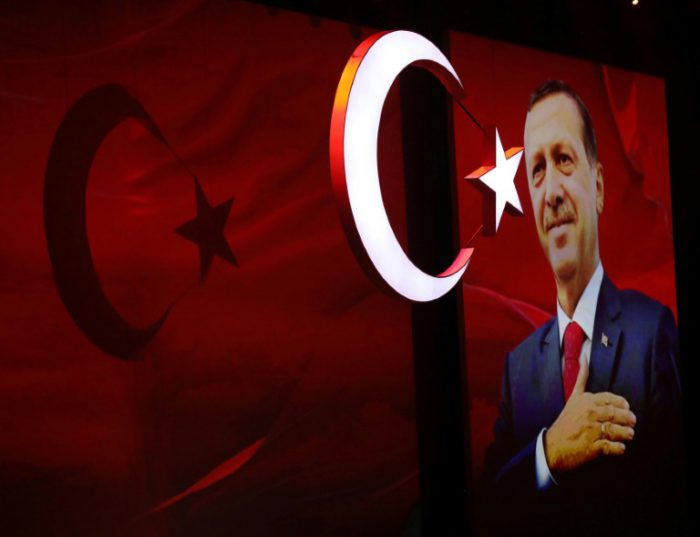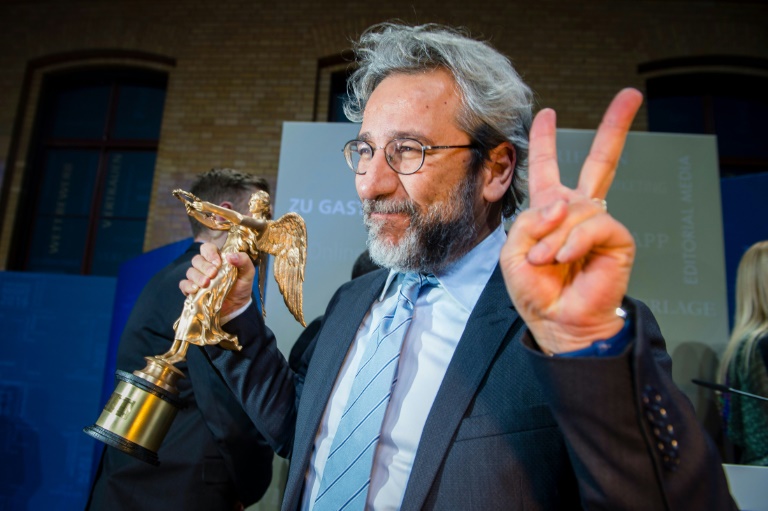Directors and journalists from one of Turkey's most respected opposition newspapers went on trial Monday in a case which has raised new alarm over press freedoms under President Recep Tayyip Erdogan.
The defendants from the Cumhuriyet daily were detained from October last year under a state of emergency imposed after the July 2016 failed coup blamed on US-based preacher Fethullah Gulen and charged with terror-related offences.
A total of 17 Cumhuriyet staff — including writers, cartoonists and executives — went on trial at the imposing palace of justice in Istanbul inside a courtroom crammed with supporters, an AFP journalist said.
Supporters released dozens of multicoloured balloons outside the courthouse, chanting: “Don’t be silenced! A free media is a right!”
If convicted, the defendants face varying terms of up to 43 years in jail.
The opposition fears the state of emergency has been used to go after anyone who dares defy the government and the trial is seen as a test for press freedom under Erdogan.
Turkey ranks 155th on the latest Reporters Without Borders (RSF) world press freedom index, below Belarus and the Democratic Republic of Congo.
According to the P24 press freedom group, there are 166 journalists behind bars in Turkey, most of whom were arrested under the state of emergency.

The trial is seen as a test for press freedom under Turkey’s President Recep Tayyip Erdogan
Erdogan, however, insisted in an interview earlier this month there were just “two real journalists” behind bars in Turkey.
In an extraordinary coincidence, the trial opened on Turkey’s annual national day of the press, marking the end of censorship in the Ottoman Empire in 1908.
– Blank columns –
Cumhuriyet (Republic), which was set up in 1924 and is Turkey’s oldest mainstream national title, has been a thorn in the side of Erdogan in recent years.
It is one of the few genuine opposition voices in the press, which is dominated by strongly pro-government media and bigger mainstream dailies that are increasingly wary of challenging the authorities.
Those appearing in court include some of the best known names in Turkish journalism including the columnist Kadri Gursel, the paper’s editor-in-chief Murat Sabuncu and the respected cartoonist Musa Kart.
Also being tried in the case is the investigative journalist Ahmet Sik who in 2011 wrote an explosive book “The Imam’s Army” exposing the grip Gulen’s movement had on the Turkish state.
Eleven of the 17 including Gursel, Sabuncu, Kart and Sik, are held in custody, while the other six are free.
“This trial is a test for Turkey,” Aydin Engin, one of the writers on trial who was freed after his initial arrest. “Erdogan says justice is balanced in Turkey. Now we will see.”

Former editor-in-chief of Turkish newspaper Cumhuriyet Can Dundar is among those being tried — in his case in absentia as he has fled to Germany
Being tried in absentia is the paper’s former editor-in-chief Can Dundar, who was last year sentenced to five years and 10 months in jail over a front-page story accusing the government of sending weapons to Syria.
He has now fled Turkey for Germany.
Those held have been detained for 267 days, with the exception of Sik, who has been held for 206 days.
Since their arrests, Cumhuriyet has continued publishing the columns of the jailed journalists but with a blank white space instead of text.
“This is a case is about criminalising journalism. It is about punishing those who speak out and if it works… then they will do it again and again,” Steven Ellis, director of advocacy at the International Press Institute, said outside the court.
– ‘Turkish journalism on trial’ –
The 17 are charged with supporting in the newspaper’s writings no less than three groups considered by Turkey as terror outfits — the Kurdistan Workers’ Party (PKK), the ultra-left Revolutionary People’s Liberation Party-Front (DHKP-C) and Gulen’s movement, which Ankara calls the Fethullah Terror Organisation (FETO).
But supporters insist the paper has always been bitterly critical of the three groups, including Gulen’s organisation. Gulen denies any link to the failed coup.
Filiz Kerestecioglu, an MP from the opposition Peoples’ Democratic Party (HDP), commented: “According to the government, all of the opposition are terrorists. The only ones that are not terrorists are themselves.”
The indictment accuses Cumhuriyet of beginning a “perception operation” with the aim of starting an “asymmetric war” against Erdogan.
“It’s journalism in Turkey, not just Cumhuriyet, that is being put on trial,” said RSF secretary general Christophe Deloire.
The UN Working Group on Arbitrary Detention, in an opinion released last month, said it found that the detention of the staff was arbitrary and that they should be immediately released and given the right to compensation.






